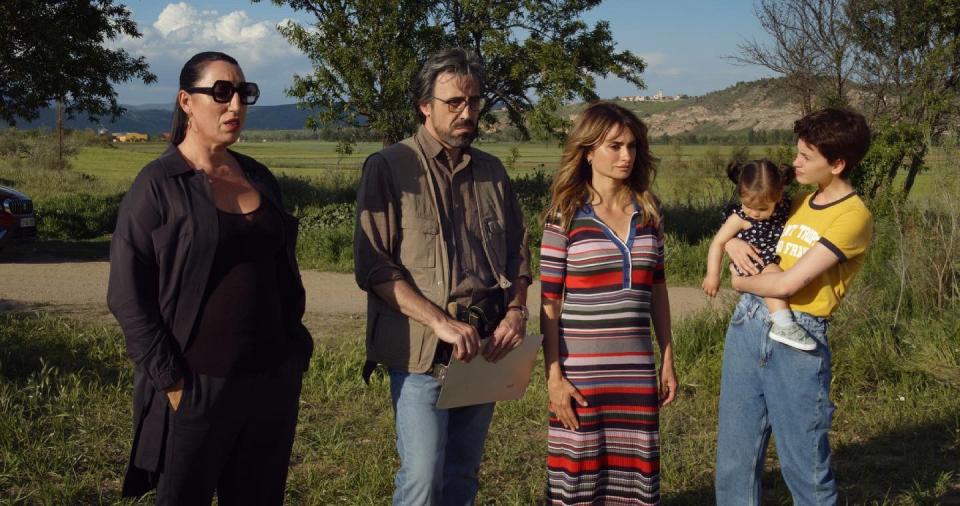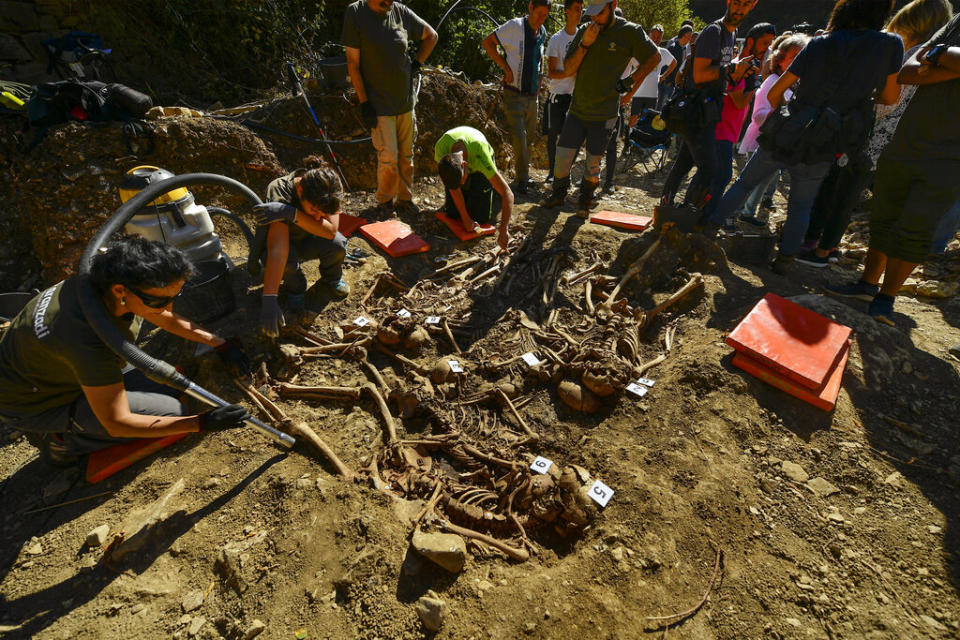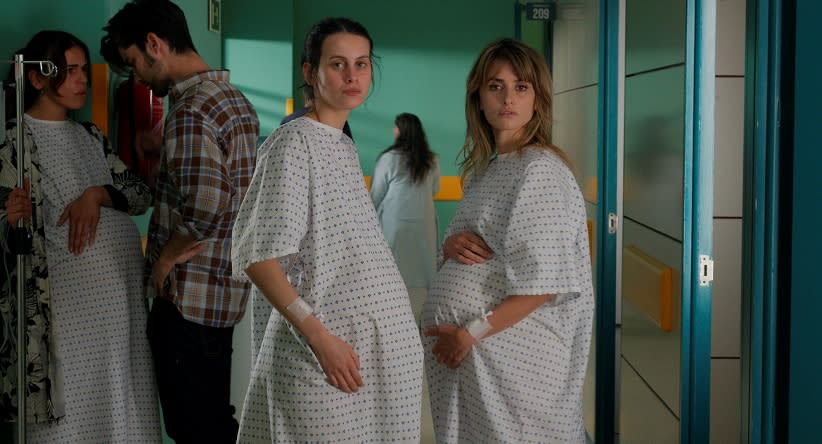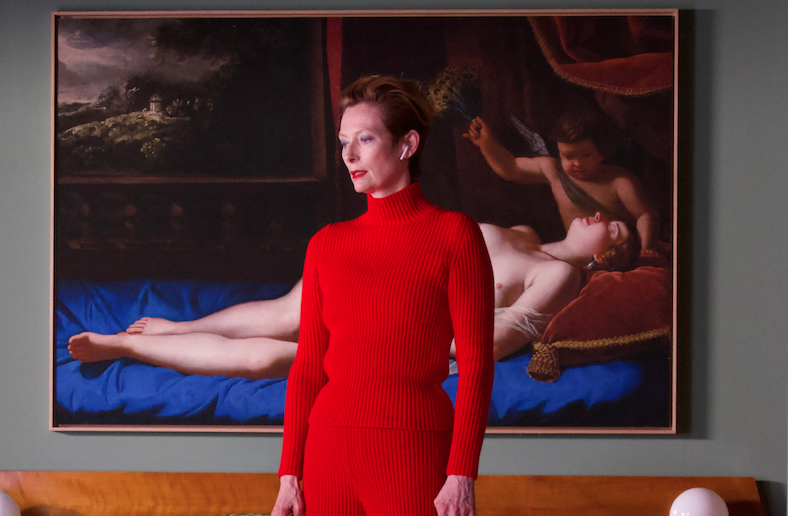‘Parallel Mothers’: Why It Took Over 40 Years for Pedro Almodovar to Confront Spain’s Darkest Chapter

- Oops!Something went wrong.Please try again later.
- Oops!Something went wrong.Please try again later.
- Oops!Something went wrong.Please try again later.
- Oops!Something went wrong.Please try again later.
When Spanish dictator Francisco Franco died in 1975, the horror of his regime was strewn across the country, in countless unmarked graves filled with citizens who opposed his rule. A young filmmaker named Pedro Almodóvar, giddy with the new freedoms of democracy, chose to ignore that dark side of history.
“I have to confess, I sort of forgot about my political leanings and dedicated myself to finally enjoying the things denied me,” the 72-year-old director said in an interview with IndieWire from New York, where his latest movie “Parallel Mothers” would soon close the New York Film Festival. He recalled the rambunctious hedonism of his early features, 1978’s “Fuck…Fuck…Fuck Me, Tim!” and 1980’s punk rock “Pepi, Luci, Bom,” which echoed the unruly underground sensibilities of John Waters and Andy Warhol.
More from IndieWire
“It was as though Franco never existed,” Almodóvar said. “We just sort of moved forward as if it hadn’t happened. That was my way of embracing democracy and turning my back on the Franco years.”
Many years and acclaimed movies later, Almodóvar is finally confronting that past, injecting his vivid cinematic talents with a bracing call to action. “Parallel Mothers,” his first feature-length effort since 2019’s “Pain and Glory,” finds Penelope Cruz playing a single parent who forms an unusual bond with a much younger woman (Milena Smit) after they meet at a hospital. In this case, however, the traditional Almodóvarian melodrama becomes as a Trojan horse to explore a recurring point of contention in Spanish society.
With some 114,000 people missing and presumed dead after Franco’s death in 1975, the country’s right wing tends to argue against exhuming hidden graves containing long-lost relatives, while others insist on it as an essential act of reconciliation. As Cruz’s character, Janis, grows friendlier with Smit’s Ana, the older woman also struggles to track down her great-grandparents’ burial site while Ana repeats a right-wing talking point about the uselessness of reopening old wounds. “I speak through the voice of Penelope,” Almodóvar said. “She’s speaking the truth about Spain.”
Few prominent Spaniards have embraced this divisive subject on an international stage, which makes it particularly significant coming from Almodóvar — the country’s most revered creative voice since Federico Garcia Lorca, who was executed during the Franco regime and whose own remains have never been found.

“I don’t have any relatives buried in a mass grave,” said Almodóvar, slipping between English and Spanish as he talked through his activist intent. “But it is more than unfair that Spain tiene muy mala relaciones con el pasado.” He turned to his translator, who chimed in: “Spain has a very bad relationship with its own past.”
While “Parallel Mothers” has been widely embraced in Spain, where it opened last week, that didn’t seem to help it with the Spanish Academy, which did not select it as the country’s official Oscar submission. Instead, the slot went to the Javier Bardem comedy “The Good Boss,” directed by Fernando León de Aranoa. “I don’t have anything to say about that because that’s the situation,” Almodóvar said. “Anyway, this is not new for me.”
Indeed: Nineteen years ago, de Aranoa’s “Mondays in the Sun” beat out Almodóvar’s “Talk to Her” as the Spanish submission. Ultimately, “Mondays in the Sun” fell short of a nomination, while “Talk to Her” landed Almodóvar nominations for Best Director and Best Original Screenplay, the latter of which he won. This time around, North American distributor Sony Pictures Classics is hoping for similar luck in major categories. Last month, Cruz scored the Best Actress prize at the Venice Film Festival, and Almodóvar plans to campaign as much as he can in the months ahead. “I don’t know what is going to happen,” Almodóvar said. “But I’ve got the feeling that the movie is being received positively in the U.S., so I will fight just to be present in other categories.”
In interviews, Almodóvar tends to embody the fragility and attention to detail of his work, but discussion of “Parallel Mothers” finds him adopting an almost professorial tone as he explains Spain’s complicated history. “This movie is a way of saying to the youth that they have to look to the past,” he said. “Right now, they might be worried about climate change, and things like that. Their whole identity is based around these big problems, which I think is important, but it’s also important to look at the past so they also understand that they’re inherited other problems that they’re currently living with. There are things we’ve inherited since the start of democracy.”

AP
The paradoxes of contemporary Spanish identity are visible across the country. When Franco’s regime ended its 36-year reign in 1975, the country embraced a decision known as the Pact of Forgetting, in which all political parties agreed to avoid litigating the Civil War to focus on a democratic transition. For years, Franco’s remains were interred at the Valley of the Fallen, a Civil War memorial and popular tourist site that celebrated both sides of the battle and valorized Franco’s rule. It wasn’t until 2019 that his remains were moved from the site to a local cemetery, despite an outcry from his family and the monastery itself. At the time, the government said the decision was designed to “symbolically close the circle of Spanish democracy.”
But Almodóvar and others argue that in order for that to happen, more graves must be uncovered. In “Parallel Mothers,” Janis says that until all of the missing persons have been found, “this war is not over.” When Ana argues that Janis should instead focus on the future, “it’s almost like a cliché narrative for the right wing, which reveals that Ana is coming from a very conservative background,” Almodóvar said. “You know, Spain is only second to Somalia in terms of missing people. When Franco condemned these people to die in these mass graves, it was a way to dehumanize them, as if they never existed. All people are asking is that their loved ones are exhumed. It has nothing to do with revenge or politics.”
In July, the Spanish government approved a “Democratic Memory” bill aimed at supporting efforts to search and exhume gravesites, as Janis does in the movie. Almodóvar himself started mulling the possibility of confronting this subject several years ago. “It comes with maturity,” he said. “For a long time, I’ve been wanting to write about this and I’ve been waiting for the right story.”
The filmmaker has been hinting at “Parallel Mothers” for a long time (there’s a fake poster for it in 2009’s “Broken Embraces”) but it wasn’t until he revisited the script during the pandemic that he realized how to use it as a vessel for a broader subject. He rewrote around 50 percent of the story, deleting a subplot involving Ana’s history with Opus Dei that he deemed too much of a distraction, and choosing instead to reflect the dogma of her upbringing through conversation. “I’ve always been very interested and invested in this topic, not for political reasons, but purely human ones,” he said. “I mean, during the entire dictatorship, nobody in Spanish households spoke of the war, because they feared reprisals.”

El Deseo
That silence hovers as an unspoken tension in Almodóvar’s homegrown universe, from the the autobiographical childhood scenes in “Pain and Glory” to the homophobic characters in the ’70s-set “Bad Education” all the way back to the sexual high jinks of his earliest work. There’s a glimpse of greater context in 1997’s “Live Flesh,” the first of his many collaborations with Cruz, where she briefly appears as a young prostitute who gives birth on a bus in the dead of night. The scene takes place in 1970, as the minister of Spain announces a state of exception prohibiting free speech across the country. “My idea was to portray this character who’s born on one of the darkest nights, politically and literally,” Almodóvar said. “I really wanted to think of him as the future of bad luck.”
That moment united the filmmaker with his muse, and in “Parallel Mothers,” Cruz is an astounding vessel for the movie’s navigation of intergenerational grief. Over the years, Cruz has said that Almodovar’s early films inspired her to act in her youth. “I remember thinking, ‘Why is this man not the president of our country?’” she said in a recent “Parallel Mothers” Q&A. “He was so much more than a director. His freedom was not normal. That was so important to me.”
Despite their familiarity, “Parallel Mothers” brought Cruz into uncharted psychological terrain. “It was very hard for her,” Almodóvar said. “She’s a very visceral actress. She needs to feel some coherence in what she’s doing. So to be able to play a character that has this contradiction of acting one way outwardly but feeling differently inwardly is very difficult to achieve for an actor.” Most rehearsals ended with Cruz in tears. “One of the ways that I would help her was to restraint that — in a way, to help her dry her tears,” Almodovar said. “If you’re someone who feels guilty, you’re someone who doesn’t necessarily cry.”
The emotion of the set also stemmed from the reunion of Almodóvar’s artistic family in the wake of the pandemic. (In addition to Cruz, “Parallel Mothers” includes a supporting role for Almodóvar regular Rossy de Palma as Janis’ close friend.) During the initial lockdown in Spain last year, Almodóvar spent a few months thinking through his next steps and writing articles musing on his past. Initially, he had planned to shoot the short film “The Human Voice” with Tilda Swinton to understand the challenge of working in English in preparation for his first English-language feature, “A Manual for Cleaning Women,” adapted from the short stories of Lucia Berlin. But when production on the feature was delayed due to the pandemic, he lost the rights to the project.
He is still in touch with Cate Blanchett about producing and starring in the movie. “I’m hoping to be able to recuperate it,” he said. He did manage to make “The Human Voice,” his dizzying 30-minute Jean Cocteau adaptation, which found Swinton roaming through a claustrophobic set and rambling on about a troubled life. The experience helped him realize that he could work in the English language, 30-odd years after he turned down an offer to direct “Sister Act” and chose to remain in Spain. “I’ve lost about 70 percent of the fear that shooting in English brings to me,” he said, and chuckled. “It was 30 minutes, but 30 minutes of talking all the time!”

The project also got him more excited about short-form projects. Almodóvar keeps numerous unrealized scripts on his computer, some of which he ends up splicing into other features. But now he realizes that he doesn’t have to force them in. “I don’t want to stretch out a short,” he said. After he finishes the promotional campaign for “Parallel Mothers,” he hopes to direct another short, which he described as a Western. He plans to utilize the dusty remnants of Sergio Leone’s Spaghetti Western sets, which are still standing in the Spanish city of Almería. “I feel much more flexible about stories now,” he said.
That impulse brings him back to his roots: Prior to his early features, Almodóvar directed gritty Super 8mm films in the waning years of the Franco regime and presented them with live commentary in bars around town. “That was my only film school,” he said. “But I feel very shy about showing them. Of course you can see my vocation of being a director, but also they were very crazy for the moment, with the kind of freedom that John Waters started. But they did have the themes that I would be involved with for the rest of my career.”
Waters was among those who surfaced to pay their respect to Almodóvar on the closing night of New York Film Festival. Over the course of a festive evening at Lincoln Center’s Alice Tully Hall, Almodóvar dashed from one “Parallel Mothers” screening to the next, in between receiving well-wishers at a cozy gathering in the upstairs lounge. Introducing the first showing of the night, the festival’s programming director Dennis Lim said that the movie possessed “an emotional vibrancy and incredible performances, but I also think there’s something new here — a kind of urgency about trauma and how it weights on us, what it means to confront it.” Almodóvar chose to withhold details in his own introduction. “I wanted to make something about the historical memory of my country,” he said, then stopped himself. “Well, I’m not going to tell you the whole story.”
Later that night, though, giddy from interacting with a range of visitors at the gathering, he introduced the final screening with an impromptu explanation of the Civil War, then tossed in some kinky praise for Cruz, saying that she made him question his sexual orientation. Back upstairs, he wore a sheepish grin. “I said something very crazy down there!” he said.
A handful of Academy members roamed the room, one of whom admitted that they had no idea about the casualties of the Franco era. As awards season revs its engine, Almodóvar was ready to keep the conversation going, regardless of the outcome. “If I get another nomination, I will be very happy,” he said. “But if I don’t, I will keep on making movies, which is the most important thing.”
Sony Pictures Classics will release “Parallel Mothers” on December 24, 2021.
Best of IndieWire
2021 Emmys Winners List: 'Ted Lasso,' 'The Crown,' and 'The Queen's Gambit' Lead the Night
2021 Emmy Predictions: Who Will Win at the Primetime Emmy Awards?
Emmy Predictions: Best Limited Series — Was It 'The Queen's Gambit' All Along?
Sign up for Indiewire's Newsletter. For the latest news, follow us on Facebook, Twitter, and Instagram.


